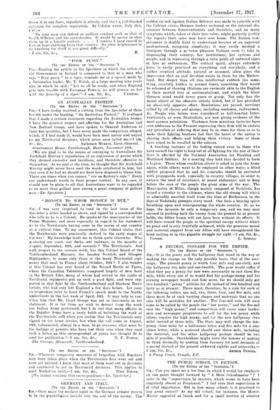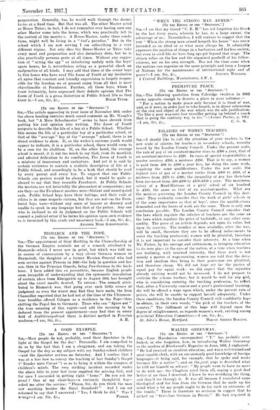THE PUBLIC SCHOOL IN FICTION.
[To run Emma or roe " Srscrsroa."1 Sus,—Can you spare me a few lines in which I would lay emphasis on one point brought forward by "A Mere Schoolmaster "? I refer to the "supervision by masters, which seems to have been singularly absent at Fernhurst." I feel sure that supervision is of vital importance. But in how many schools is it practised to any great extent? At my old school, for instance, the House- Master appeared at lunch and for a small portion of evening
preparation. Generally, too, ho would walk through the dormi- Mries at a fixed time. But that was all. The other Blaster acted as House Tutor; in fact, I do not remember ever Laving seen any other Master come into the house, which was practically left to the control of the monitors. A House-Master, under these condi- tions, might well bo living in a "fool's paradise." But in the school which I am now serving I am subscribing to a very different regime. Not only does the House-Master or Tutor take every meal and preparation and also dormitory duty, but he is also practically persona grata at all times. Without any sugges- tion of "acting the spy" or interfering unduly with the boys' spare Lours, he is nevertheless acting as a powerful check on malpractice of all kinds. I may add that those of the senior boys in this house who have read The Loom of Youth at my invitation all agree that constant and friendly supervision is largely respon- sible for the freedom we at present enjoy from all that is most objectionable at Fernhurst. Further, all these boys, whom I know intimately, have expressed their definite opinion that The Loom of Youth is a gross distortion of Public School life as they















































 Previous page
Previous page